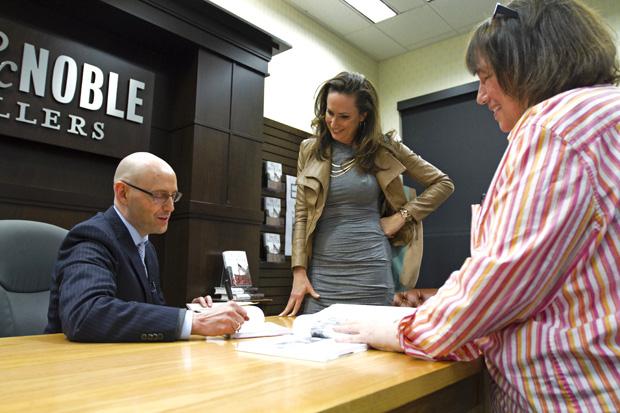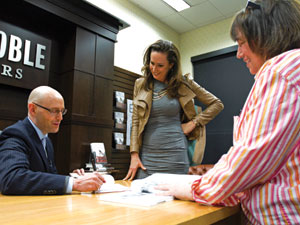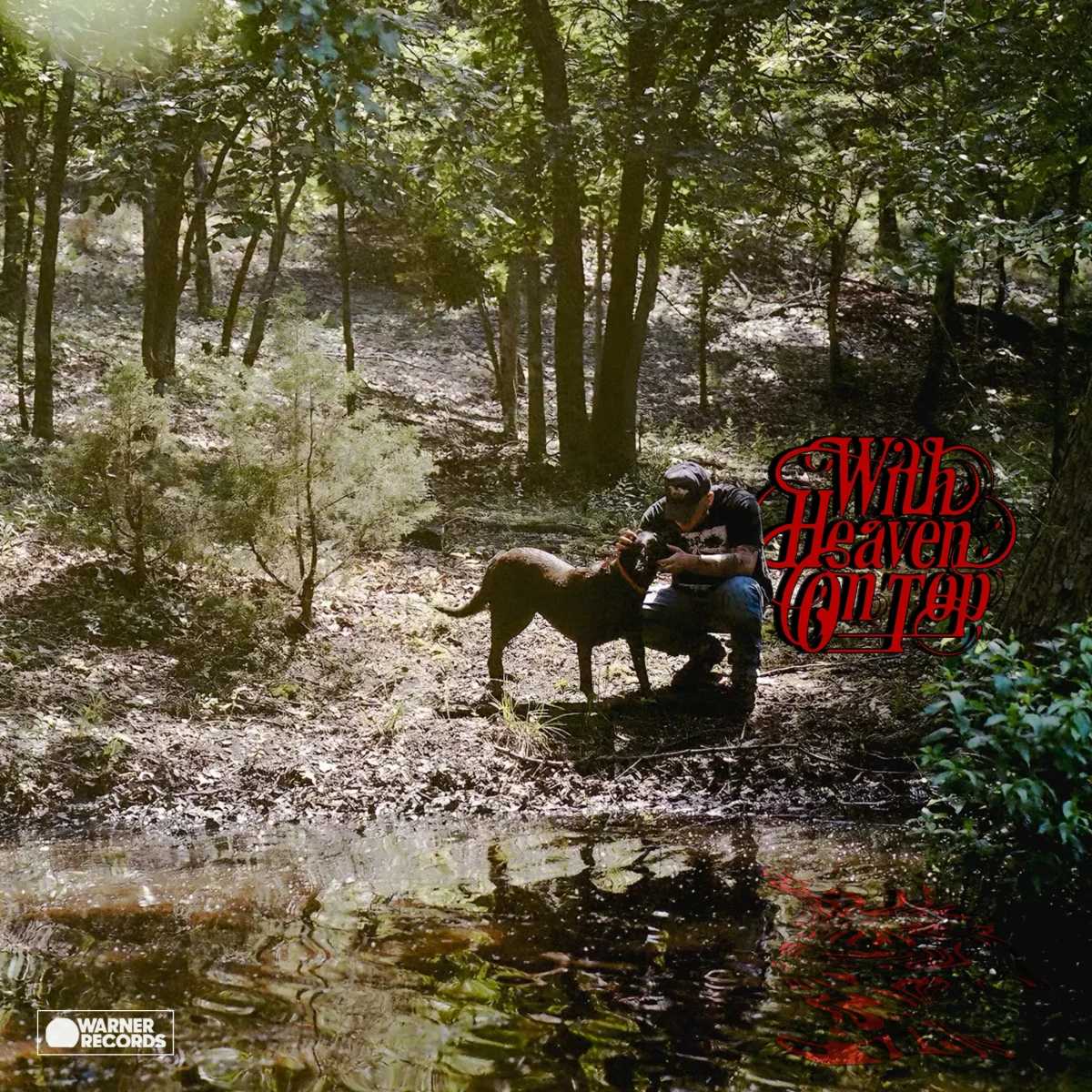
Not every author can say they’ve written eight New York Times best-selling novels. Brad Meltzer can. Some classify him as a political-thriller writer, but it’s hard to barricade a him in that genre considering his succeeding indie film director Kevin Smith (Clerks, Chasing Amy, Dogma) with a six-issue stint writing DC Comics’ “Green Arrow,” not to mention his own best-selling comic book limited series “Identity Crisis.”
After creating History Channel’s “Brad Meltzer’s Decoded,” he cemented his status in pop culture as an investigator and history nerd alike. Diving into nonfiction in an attempt to recount the stories of heroes his son could learn from, from the Wright brothers to Jim Henson, another bestseller was born.
Meltzer’s latest novel, “The Fifth Assassin,”released earlier this month, focuses on a serial killer who is meticulously recreating the crimes of all four successful U.S. presidential assassins.
Just before his final book tour appearance, Meltzer took a few minutes out of his hectic schedule to talk with the Sundial.
Daily Sundial: A good majority of your books have numbers or elements of a number in the title, “The Tenth Justice,” “Dead Even,” “The First Counsel,” “The Millionaires,” “The Zero Game” and now “The Fifth Assassin.” Why have you chosen to include numbers in the titles of your works?
Brad Meltzer: You know, because I’m obsessive, why else? The truth is I just like them as titles. Some people love a kind of beautiful description that is vague and invokes a beautiful memory or scene. For me a thriller should really be something that punctuates hard, like an exclamation point, and I just think those numbers always inevitably force the question of, “who is that person?” “What is that item you’re talking about?”
The real answer at the end though is that I’m terrible with titles. I always have readers on our Facebook page and twitter vote for the title, so what you’re seeing is also the result of lots of voting. It’s the one thing that I feel like I can do by committee. To me, I want to write a 500 page book, I can’t reduce it to three words.
DS: You must have gotten to know the character of Beecher White pretty well by this point, being in both “The Inner Circle” and now “The Fifth Assassin,” are there any ways his evolution as a character has surprised you?
BM: It always does. Every character, if you’re doing your job right, should surprise you. In fact, when you finish a book, when I finish the first draft I always go back and look and see, “okay, let me see how I did”. Of course there are the things you plan to put in there but inevitably you’ll see the things you didn’t even realize you were putting in there.
When I finished this book, the first draft of it, I looked at the book and read it and I said “okay, what’s in here?” And I said “oh of course, this book is about growing up”–that’s what Beecher’s doing here, he is growing up. This is the first novel I’ve written since both my parents had passed away, so I had no choice but for this book to be about growing up.
DS: Is there anything you have in common with Beecher?
BM: I think the real question is: is there anything I don’t have in common with Beecher? I mean, Beecher isn’t just my personal fantasy, he’s my protector. He really does, as I worked through the issues of my own parents and their loss, Beecher is dealing with those issues. He really gets to step up and protect me, I know that sounds a little insane, but he is this kind of magical totem for me that saves me from a lot of heartache.
I think he’s smarter than I am, he’s sharper than I am and what I love about Beecher is, Beecher will always try to do the right thing. It doesn’t mean he always does it correctly or that he does it right, but he will always try to do the right thing. You know what? And we’re both history nerds.
DS: How has your writing process evolved since you first started your first published novel, “The Tenth Justice”?
BM: One, they’re actually being published. My first novel which came before the Tenth Justice, it got me 24 rejection letters. There were only 20 publishers at the time and I got 24 rejection letters. But as far as the actual writing goes, I think I’m just more honest about myself and what I want to write about.
I think if you look at the earlier interviews I did, you ask me a question and I’d say everything’s good and everything’s great and I’m just happy to be here. Of course I’m happy to be here, but I think I was terrified to give any answer that showed any moment of weakness, and I think the same with my characters. I think in the early books my heroes, even though they were always flawed, I don’t think I was always exposing all of my flaws. And I think as I’ve gotten older I realized it’s absolutely okay and even helpful to show those flaws. It’s just much more honest.
DS: I’ve read that you would be thrilled to see a film adaptation of “The Zero Game,” the one novel you don’t own the rights to. What about films that bastardize the literature they’re re adapted from? What type of role would you like to play in the making of such a movie to prevent that from happening?
BM: There’s a reason that happens and it’s because it’s very hard to keep control. It’s like trying to shovel water. And as you spend time trying to tame the Hollywood monster, the one thing I’ve learned is simply this: If you don’t want Hollywood to screw up your book, don’t sell them your book.
DS: How was the experience straying from thriller novels to the nonfiction “Heroes for My Son” and “Heroes for My Daughter”?
BM: Honestly, it wasn’t much of a difference, except for the part that you have to suddenly get things right, which obviously creates its own challenges, because in fiction I can make everything up. But the truth is whether I’m writing about George Washington or Abraham Lincoln or Superman, to me they all have the same thing in common, which is they are part of our American mythology.
And yes, two of them are real and one of them wears his underwear on the outside of his pants and is imaginary, but the reason all of them are important is because they’re not just great stories, but they tell something about us and that’s why their stories persist.
DS: How did it feel having your first nonfiction work [“Heroes for My Son”] make number two on the New York Times Bestsellers list?
BM: That’s probably because my family bought a lot of copies. I mean, the truth? How do you think it feels, it feels great. I did those books for my kids. That’s it. I didn’t do it for the money, I didn’t do it for the marketing, I didn’t do it for the power play, I didn’t do it for any selfish reason, I did it for my kids.
They launched those books with an advertising budget of zero. Almost zero dollars were spent on the advertising. My novels they make a big deal over, we do things. With this, they just were like “you know what, we like this book, we’re just going to put it out there,” so to watch people react to it was amazing, but I want to be very clear, the success of those books had nothing to do with me. It was that people loved the stories of Rosa Parks and Jim Henson and Mr. Rogers. That’s who deserves the credit.
DS: You’ve been considered a legal thriller, psychological thriller, political thriller writer. Nobody really likes to be bound to a genre, and you’ve broken some those barriers. How would you classify yourself as an author at this point in your career?
BM: I appreciate that. I mean, I always think of myself as just an author, that’s it. From the beginning when legal thrillers were big they called me a legal thriller writer, then when I wrote a financial book they were like “you’re a financial thriller writer” and then I write them a history and they’re like “you’re a historical thriller writer.” The truth is, I’m just writing about topics I like, but people like neat little boxes and they always want to place you in neat little boxes because it makes you easy to understand. To me, that’s just subject matter. It has nothing to do with quality or anything else, so the more we can break those boxes, I think the better or everyone.
DS: You’ve done a lot of work on comic books, what elements of comic books do you prefer over novels in regards to both reading and creating them?
BM: Silence. That’s the one thing that comics do so beautifully, is you can do silent. You can just show a character, in a room, saying nothing, and you can do a full range of emotions. In a novel, yes, I can paint the picture and describe how the character is feeling and use all the words that I need to paint that moment, but I’ve got to use the words. There’s something very elegant about the simplicity of silence, so for that, comics just kill it.
DS: Are there any novels you’ve written that you wish you could re-do as a graphic novel?
BM: I’m a pig. I’d love to see them all as comics. That’s one of the forms I love most, and I’ve been approached by people that said, “do you want to do the comic book form” but I feel that when you do it, I want to do it well. I don’t just want to do it because I want to see my name on a comic book, I want to do it because the medium will actually add something to the story.
As soon as we can figure out a way, or someone figures out a way to do that, I’m of course interested in talking about it, but I feel like you shouldn’t just turn everything into a comic because suddenly comics are selling, I think you have to figure out why you’re telling the story in this medium. When we did “Jack and Bobby” a number of years ago, that could have easily been a book, but when we looked at it, it just made much more sense as a TV show. It was a long-form story that we wanted to tell over and over and it was going to have multiple iterations of the story. It lent itself to television and its episodic nature, which is why we did it like that instead of a novel. I think you have to pick the medium that lets you best paint your picture.
DS: Can we ever expect a full length graphic novel from you?
BM: To me, that’s what Identity Crisis is, and in a strange out way that’s what my run on Justice League was. I mean, I know they’re printed in a monthly format, but when you wind them together they read as a novel. There’s a beginning, there’s a middle, there’s an end. They all tie together. No question Identity Crisis is one, I wrote that like a novel. I actually finished the entire book, I think almost over 200 pages, before handing any of it in to the publisher. I just had to write it like a novel because I’m a novelist, that’s how I know to do it. I don’t write it episodically, I just sit down and write them as chapters.
DS: I’ve heard that the History Channel has been noncommittal if there will be a third season of “Decoded”. What do you know about its status?
BM: The truth is, we just finished airing the last episode three weeks ago, so we’re just waiting to hear on season three. It just came off, so we’ve got to give them time to make a decision.
DS: What is the ONE mystery you really want to prove or debunk?
BM: I’d love to really pull apart the JFK story. I know it seems so overdone, but I think that for a generation of people out there JFK’s story comes almost solely from the Oliver Stone movie, which even Oliver Stone acknowledges has parts that are completely made up.
I think there’s almost a responsibility to separate some of the facts from fictions, because otherwise, in this society where we have access to the internet, the one thing we have access to is so much more noise than any generation. I think what we’re all seeing, and everyone sees when they go on to Google and do a search, is that it’s easy to find information, what’s hard to find is what’s actually true and separate that from what’s actually nonsense.






